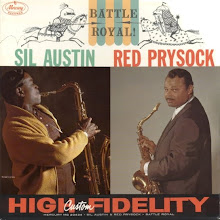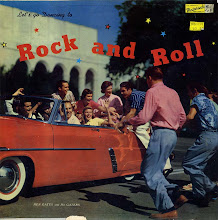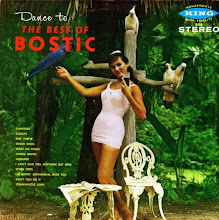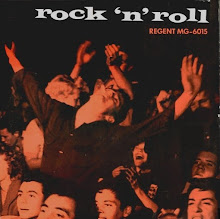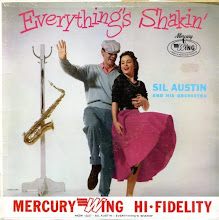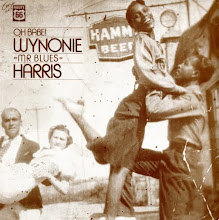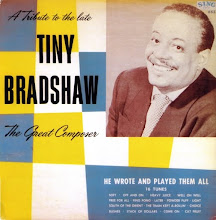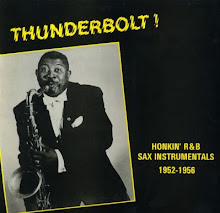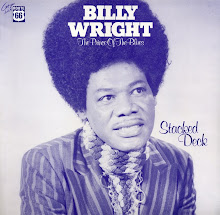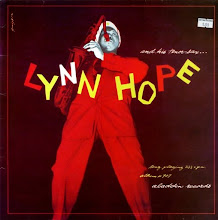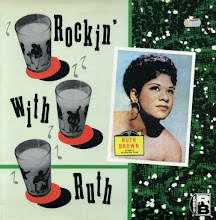Side 1:
01. Buzz Buzz Buzz
02. Sure Had A Wonderful Time Last Night
03. I Miss You So
04. Hey! Sister Lucy
05. No Baby No!
06. Ooh, Look-A There Ain't She Pretty
Side 2:
01. Ain't She Mean
02. It's a Quiet Town In Crossbone County
03. Convertible Cadillac
04. Sometimes I'm Happy
05. Why Did You Get So High, Shorty
06. Everybody Get Together
Download from here:
http://www15.zippyshare.com/v/1wIxKQco/file.html
Facts on the tracks, Jack:
Personnel on tracks 1 - 10: The Trenier Twins : Claude Trenier, Cliff Trenier (vocals) acc by Gene Gilbeaux Orchestra : Don Hill (alto sax); William "Buddy" Collette (tenor sax); Gene Gilbeaux (piano); Bob Bain (guitar); Herman Washington (bass); Henry Green (drums)
"Buzz Buzz Buzz" and "Sure Had A Wonderful Time Last Night" were recorded in New York on May 15th, 1947. Released on Mercury 8045 in June 1947.
"I Miss You So," "Hey! Sister Lucy," "No Baby No!" and "Ain't She Mean" were recorded in New York on September 16th, 1947. "I Miss You So" / "Hey! Sister Lucy" released on Mercury 8058 in October 1947.
"Ooh, Look-A There Ain't She Pretty," "It's a Quiet Town In Crossbone County," "Convertible Cadillac," and "Sometimes I'm Happy" were recorded over two sessions in December 1947. Remaining Mercury releases were as follows:
"No Baby No!" / "Ooh, Look-A There Ain't She Pretty" Mercury 8071, January 1948.
"Ain't She Mean" / "It's a Quiet Town In Crossbone County" Mercury 8078, March 1948.
"Convertible Cadillac" / "Sometimes I'm Happy" Mercury 8089, June 1948.
Several sources list a November 1948 repressing of Mercury 8089 with "Convertible Cadillac" / "Near To Me" as the featured sides.
Personnel on "Why Did You Get So High, Shorty" and "Everybody Get Together": Claude Trenier, Cliff Trenier (vocals) acc by Gene Gilbeaux Orchestra: Don Hill (alto sax); unknown other horns, Gene Gilbeaux (piano); unknown (drums).
These sides were recorded in Los Angeles, circa January 1950 and released on London 17007 in March 1950. Release was credited to "The Treniers with Gene Gilbeaux And His Orchestra."
London was originally an outlet for UK Decca material in the US (Vera Lynn, George Formby, Edmundo Ros, Billy Cotton, etc), but also started issuing American pop, hillbilly and R&B recordings, with R&B records bearing a green label.
The Treniers! This post started out being a re-up of an LP of early 1950s Okeh sides by the group which was a big influence not only on Bill Haley but also on several other early rock 'n' roll acts (mostly originating from the Philadelphia area or upstate New York) such as Charlie Gracie, Freddie Bell and the Bellboys, and Jimmy Cavallo. As I started listening to The Treniers here at Radio Be Bop Wino, I realised I had the tracks to make up a little homemade compilation of pre-Okeh Treniers tracks, specifically their Mercury sides recorded in 1947 and their 1950 single on London.
So what he have here isn't the rockin' and rollin' Treniers but the Louis Jordan influenced jump blues combo which recorded under the moniker of "The Trenier Twins", with the exception of the final track on the collection, "Everybody Get Together" which, with its unruly bawlin' and squallin', foreshadows the rockers which The Treniers would start issuing on Okeh the following year.
Although several members of the rather large Trenier family were at one time or another members of the group, it was always about the identical twin brothers, Claude and Cliff. Born in Mobile, Alabama in 1919, the boys were encouraged to play musical instruments by their father, and when they enrolled at Alabama State College in 1940, their musical interests soon overshadowed their studies. Seriously, who would want to study to be a teacher when there is a chance to jump and jive to one's hearts content? Especially if the little band you form gets to share a bill with Louis Jordan. It was a no-brainer. While at college the boys made the acquaintance of two more musically inclined students who would go on to be a vital part of their later professional success - alto sax player Don Hill and pianist Gene Gilbeaux.
World War Two interrupted the jumpin' and jivin' as Claude was called up by Uncle Sam. Upon leaving the forces in 1944 he joined the Jimmie Lunceford band out on the West Coast. Soon twin brother Cliff was also a band member and in early 1945 the boys made their first recording as a duo with the Lunceford band - "Buzz Buzz Buzz" - which lay unreleased until 1949.
After leaving the Lunceford band, the boys split up, with Cliff returning to Mobile and Claude opting to stay on in Los Angeles to try his hand at a solo musical career. He had some success, obtaining residencies at various clubs, including the Club Alabam where he replaced Wynonie Harris, and also spots with various small groups including
Big Jim Wynn's band with whom he recorded a second version of "Buzz Buzz Buzz" and "Ee-Bobaliba" in late 1945. In 1947 Claude persuaded Cliff to rejoin him out west and while working in San Francisco they met their old student compadre Gene Gilbeaux who was able to call Don Hill and the act which was at first known as The Trenier Twins with Gene Gilbeaux's Orchestra was formed.
The group was signed by Mercury Records for whom they recorded 5 singles between May and December 1947. A combination of the Petrillo recording ban and a punishing live schedule kept the Treniers out of the studio until early 1950 when they recorded a single for London Records - the Jordanesque "Why Did You Get So High Shorty?" and the first recorded indication that their jump blues sound was changing into proto rock and roll, "Everybody Get Together."
Above: The Treniers, 1950. In the background - Don Hill and Gene Gilbeaux.
The act was getting wilder with all sorts of fast paced dance and comedy routines mixed into the diet of rockin' music. It was around this time that Bill Haley, then leading a hick cowboy band called The Saddlemen, saw The Treniers in action at a club in Wildwood, New Jersey. What he saw impressed him mightily and helped him to decide to mix a little rhythm and blues into his act. Meanwhile outside the club there was a Philadelphia kid called Freddie Bell (or more likely at that time Ferdinando Dominick Bello) hanging around doing vacation jobs such as shoe shining. Freddie heard, and Freddie liked. The Treniers liked him back, they even nicknamed him "Ding-Dong." Sounds like a song ...
"We'll be back in Be Bop Wino's next post!"

































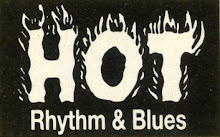
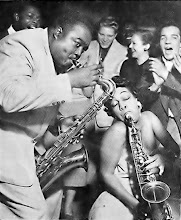





%20(3).jpg)


%2045%20-%20300A.png)















